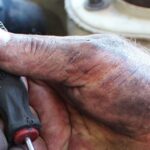After a car accident, one of the first questions that springs to mind is, “How long will it take to get my car fixed?” If you’re going through insurance, this process involves a few key steps that determine the overall timeline. It’s important to understand that while your insurance company plays a crucial role in approving and paying for the repairs, they aren’t directly involved in the physical repair work itself. This is where many car owners find themselves wondering about the delays and the actual time frame.
The initial step involves your insurance adjuster. Once you’ve chosen a repair shop, an adjuster from your insurance company will visit the shop to assess the damage to your vehicle and determine the extent of repairs needed. This evaluation is critical as the adjuster’s report dictates what the insurance company will cover. Typically, this initial assessment and approval process takes approximately 4 to 5 business days. However, this is just the beginning of the timeline.
It’s also worth noting that insurance companies often suggest specific auto body shops, sometimes implying that you must use their recommended facilities. Despite these suggestions, remember that you have the legal right to choose any repair shop you prefer. Insurance companies recommend certain shops because they have established direct repair programs (DRPs). These programs benefit the insurer through pre-negotiated rates on parts and labor, and they help claims representatives meet internal targets for directing claims to these preferred networks. This is why you might encounter statements like “that shop is not in our preferred network,” “we cannot guarantee the work at that shop,” or “using that shop may delay your claim.” Being informed about your rights empowers you to make the best decision for your vehicle repair.
When selecting a car repair shop, several factors should be considered to ensure a smooth and satisfactory repair experience:
-
Choose a Certified Repair Shop: Opting for a shop that is certified by your vehicle’s manufacturer is a significant advantage. OEM (Original Equipment Manufacturer) certifications indicate that the shop has met stringent standards for training, equipment, and repair procedures specific to your car’s brand. For instance, Cline Collision Center holds OEM certifications from various manufacturers including Chrysler, Dodge, Ford, Honda, and Nissan. These certifications assure you that the technicians working on your car are experts in handling your specific vehicle make and model.
-
Review Online Feedback: Explore online reviews on platforms like Google and Yelp. While online reviews are often polarized – people tend to review when experiences are extremely positive or negative – they can still provide valuable insights into a shop’s reputation and customer service. Look for patterns in reviews to gauge the general customer sentiment towards the body shop.
-
Assess Professionalism and Customer Service: The quality of customer service is as crucial as the repair work itself. A professional and courteous staff can make the entire repair process less stressful. Choose a shop where you feel valued and respected, and where staff are communicative and helpful, like Cline Collision Center known for its customer-centric approach.
-
Demand a Free Written Estimate: Always request a detailed written estimate before authorizing any repairs. This estimate serves as a contract, outlining the scope of work and the associated costs. A written estimate protects you from unexpected charges and ensures transparency from the outset. It should clearly list all parts and labor involved in the repair process.
-
Inquire About Vehicle Detailing: While not the primary concern, a reputable auto body shop should detail your vehicle after repairs. Detailing helps restore your car to its pre-accident condition, both aesthetically and in cleanliness. After investing in repairs, receiving your vehicle back clean and detailed enhances the overall satisfaction with the service.
In conclusion, while the insurance approval process typically takes about 4 to 5 days, the total time for your car to be repaired depends on various factors, including the complexity of the damage, parts availability, and the repair shop’s schedule. By understanding the insurance process, knowing your rights as a consumer to choose your repair shop, and selecting a reputable and certified facility, you can navigate the post-accident repair process more effectively and ensure your vehicle is restored to its best possible condition in a timely manner. For further assistance or to get a free estimate, you can contact certified facilities like Cline Collision Center in Santa Rosa, CA, during their business hours from Monday to Friday, 8 a.m. to 5 p.m.

